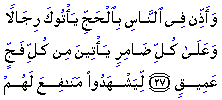Benefits of Hajj, Newborn Child, Malcolm's Hajj Experience
Issue 259 » January 30, 2004 - Zul-Hijja 8, 1424
General
| Living the Quran |
Al-Hajj
(The Pilgrimage)
The word "benefits" is in the indefinite, implying all types and numerous forms of benefits. Most notable among these benefits are the purification of the soul, refinement of character, refreshing of one's spirit and the spiritual training that takes place in the most honourable land on this earth. In addition to the points made above, one may note some of the following effects of Hajj in the purification of one's soul:
Source: |
| Understanding the Prophet's Life |
Like a Newborn Child The Prophet, peace and blessings of Allah be upon him, said: "Whoever performs the Hajj for the sake of Allah and does not commit any lewdness or evil returns like the day in which his mother gave him birth." [Bukhari, Muslim] Sins can be forgiven at any place, no matter where the person is: it is not essential to be at Arafat or Kaba, but because many benefits, blessings, and heartfelt feelings which these Symbols, places and the rites of Hajj produce - which are not found anywhere else - they provide a better environment for asking for forgiveness with sincerity of heart. These are the places where the blessings and mercies of Allah descended on the prophets, where the prophets were showered with Allah's light of guidance, where the Signs of Allah and His prophets are found everywhere, where in the past Allah's devotees have conversed with Him, and where all the pilgrims assemble, pray, cry and lament together for forgiveness. The environment and atmosphere of these places surely help the pilgrims to pray from the bottom of their hearts with the result that the prayers are accepted. Source: |
| Cool Bits! |
Malcolm's Hajj Experience There were tens of thousands of pilgrims, from all over the world. They were of all colors, from blue-eyed blondes to black-skinned Africans. But we were all participating in the same ritual, displaying a spirit of unity and brotherhood that my experiences in America had led me to believe never could exist between the white and the non-white. You may be shocked by these words coming from me. But on this pilgrimage, what I have seen, and experienced, has forced me to rearrange much of my thought patterns previously held, and to toss aside some of my previous conclusions. This was not too difficult for me. Despite my firm convictions, I have been always a man who tries to face facts, and to accept the reality of life as new experience and new knowledge unfolds it. I have always kept an open mind, which is necessary to the flexibility that must go hand in hand with every form of intelligent search for truth. During the past eleven days here in the Muslim world, I have eaten from the same plate, drunk from the same glass and slept in the same bed (or on the same rug)-while praying to the same God with fellow Muslims, whose eyes were the bluest of the blue, whose hair was the blondest of blond, and whose skin was the whitest of white. And in the words and in the actions and in the deeds of the ‘white' Muslims, I felt the same sincerity that I felt among the black African Muslims of Nigeria, Sudan and Ghana. We are truly all the same-brothers. All praise is due to Allah, the Lord of the worlds. Source: |
